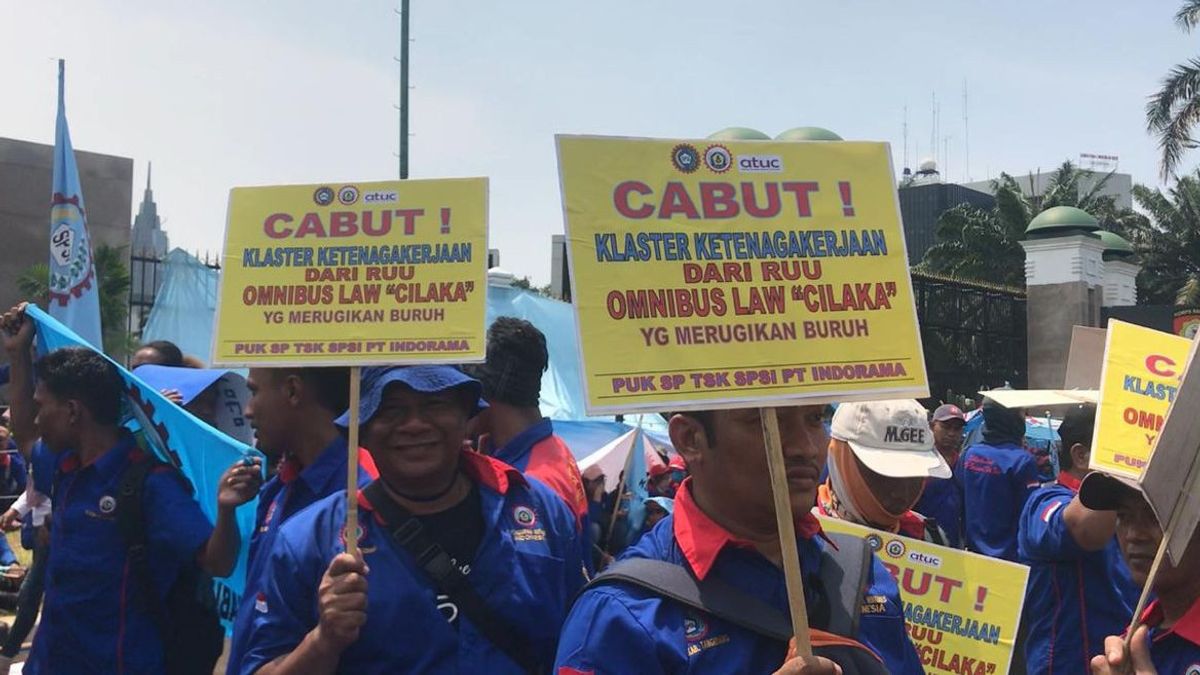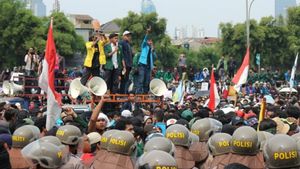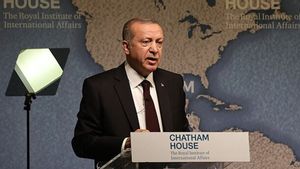JAKARTA - The Omnibus Law The draft of the Work Creation Bill (RUU) has not yet begun the discussion, it has already drawn a lot of resistance. In fact, the initial intention of the government to make this 'sweep the universe' regulation was to increase economic growth. However, in fact, the bill neglects the welfare of Indonesian workers.
One of the most highlighted by the public is the sweetener or sweetener offered by the government in the draft of this Job Creation Bill. The form of sweetener is bonus money which is equal to five times the salary for all official workers.
In the work creation Omnibus Law draft received by VOI, the bonus rules in question are the closest to other award rules. This rule is regulated in Chapter IV concerning Manpower, in Article 92.
Art 92
(1) To improve workers' welfare, employers based on this Law give other awards to workers / laborers.
(2) Other awards as referred to in paragraph (1) shall be given on condition that:
a. workers / laborers who have worked less than 3 (three) years, amounting to 1 (one) time wages;
b. workers / laborers who have worked for 3 (three) years or more but less than 6 (six) years, amounting to 2 (two) times their wages;
c. workers / laborers who have worked for 6 (six) years or more but less than 9 (nine) years, amounting to 3 (three) times their wages;
d. workers / laborers who have worked for 9 (nine) years or more but less than 12 (twelve) years, amounting to 4 (four) times their wages; or
e. Workers / laborers who have worked for 12 (twelve) years or more, amounting to 5 (five) times their wages.
(3) Other awards as referred to in paragraph (1) shall be given for 1 (one) time within a period of 1 (one) year since this Law comes into effect.
(4) The provisions referred to in paragraph (2) shall apply to workers / laborers who worked prior to the enactment of this Law.
(5) Provisions regarding other awards as referred to in paragraph (2) do not apply to micro and small businesses.
Head of the KSPI Communication and Media Department Kahar S Cahyono said that the sweetener in the Job Creation Bill offered by the government is only a diversion of public attention. This is because the sweetener is given but the welfare of the workers is neglected.
According to Kahar, what Indonesian workers really need right now is not 'sweeteners' but job security. Because, in this draft bill the threat to Indonesian workers, especially new workers, is increasingly real.
"This sweetener or sweetener has no meaning for KSPI because it is only given once. Then there is no penalty if the company does not provide it. What's worse is that other workers' rights are eliminated. Regarding contracts, outsourcing, severance pay is reduced a lot," he said. , when contacted by VOI, in Jakarta, Thursday, February 27.
Kahar said this sweetener was only temporary. However, if you look at the long term, many workers' rights are being eliminated. In fact, if this Manpower Act (UU) is to be fixed with the aim of providing welfare to workers, the orientation must be to look to the future.
"It must be considered for those who are still looking for work until they get a job. But (this bill) is not like that. There is this sweetener, but it closes a lot of things that have been reduced from the previous regulations," he said.
According to Kahar, the basis on which his party rejected the Job Creation Bill was the absence of job security, income security and social security. However, if the government fulfills these three things, without offering sweeteners, Indonesian workers will not object.
"This means that for example there is certainty in work. It is not easy to get laid off, cannot be contracted arbitrarily, cannot be outsourced. Then the wage is decent, without even a sweetener, we really don't have a problem. So there is no sweetener, that's okay," he said.
Kahar said that his party did not agree with the DPR or the government, which said that this draft was just a draft. Where, he said, the discussion process may still change.
"A drafting of a law starts from its preparation, the process of drafting it until the discussion and promulgation of it becomes a series. If the initial draft is such a mess, we can expect that the output will not be much different," he explained.
According to Kahar, if the government was serious about improving the welfare of Indonesian workers, the draft should have been prepared from the start.
DPR Will Fight For Workers' Rights
Member of Commission IX Intan Fauzi said this bill was a proposal from the government. Rejection that occurs because the union and workers feel that they are not involved. However, this bill has not been discussed, in fact it is still a draft that might change.
Regarding the unions' concerns about the lack of job security in this bill and regarding the sweetener offered by the government, said Intan, the government and the DPR will definitely discuss it. Of course, this discussion also involves trade unions and business actors.
"I am very sure that it is included in the discussion. If it later contradicts the Manpower Law it cannot. Even if we want to change it, we also cannot be anti-change. Of course the change should not neglect (welfare)," said Intan.
Commission IX, said Intan, will definitely examine the articles in the Job Creation Bill which are in direct conflict with employment. According to him, the DPR will not ignore the interests and welfare of workers.
"Certainly (we speak deeply). Because if we discuss the draft law, it is a hearing, then also an academic study. We will really discuss article by article, we Commission IX will definitely not ignore the workforce but we also encourage it. increased investment, "he explained.
Previously, the Coordinating Minister for the Economy Airlangga Hartarto was of the view that the Job Creation Bill aspires to create an advanced, prosperous Indonesian society. This is done through efforts to fulfill the citizens' rights to work and livelihoods through copyright work. In the process, the Job Creation Bill pays attention to the signs and corridors of the constitution and follows the constitutional hierarchy.
"Of course this is in accordance with Pancasila and the 1945 Constitution of the Republic of Indonesia and there is no law below that cancels the above," Airlangga said at the CNBC Indonesia Outlook 2020 event, Wednesday, February 26.
The English, Chinese, Japanese, Arabic, and French versions are automatically generated by the AI. So there may still be inaccuracies in translating, please always see Indonesian as our main language. (system supported by DigitalSiber.id)













